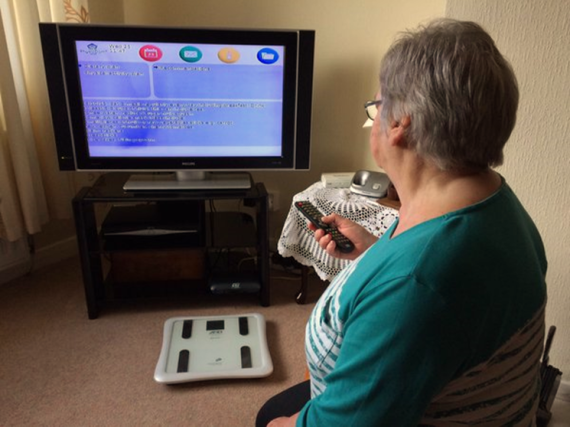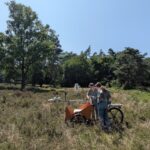‘Work pressure in the health sector is high and it is also not always clear exactly which health worker is responsible for screening for undernutrition,’ says Van Doorn-van Atten. ‘So a lot of old people fall between two stools.’ In her doctoral research at Human Nutrition, she studied the potential of telemonitoring, a system with which people keep records themselves at home and get advice from a distance.
Monitoring programme
The study involved 204 Dutch over-65s who received home care, half of whom followed a telemonitoring programme for six months. The other half formed the control group. Participants weighed themselves weekly and recorded the exercise they got for one week per month using a step counter. Some of them also monitored their blood pressure. Halfway through the study, they filled in a questionnaire about their eating habits and appetite. The participants got their results via the television, along with advice on better eating and exercise habits.
The programme led to better, healthier eating behaviour among the people involved. Van Doorn-van Atten: ‘They could have been put off by the technology. That was the case during the pilot, but after that we made it more user-friendly.’ In the end, 20 per cent of the participants dropped out of the programme before the end, mostly for health reasons.
Quite tricky
Although the participants in the trial said they found the technology quite tricky, most of the elderly people were quite positive about the programme. The nurses were less enthusiastic, partly because they had to help the old people with using the programme. ‘That’s a pity, because they idea was to lighten the nurses’ workload,’ says Van Doorn-van Atten. ‘Now the nurses mainly visit the people who need that extra help, so perhaps that distorts the picture a bit. But it does show that we need to make the technology more user-friendly.’ She expects future generations, who grew up with the internet and online television, will not find it as difficult.
There will be no mass shift to telemonitoring for now. ‘We would first need to find out whether the costs are in proportion to the benefits. Fortunately, health insurance companies are showing more and more interest in preventive care.’

 In PhD researcher Marije van Doorn-van Atten’s study, elderly people received advice on diet and exercise via a TV channel. Photo: Cybermoor
In PhD researcher Marije van Doorn-van Atten’s study, elderly people received advice on diet and exercise via a TV channel. Photo: Cybermoor 

